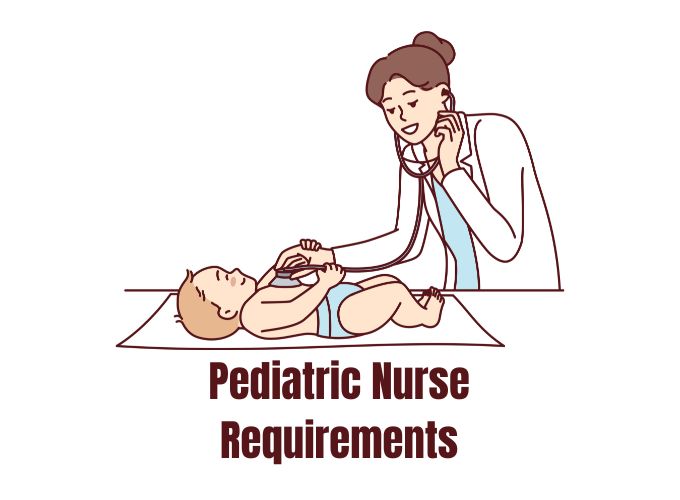Welcome to the world of pediatric nursing, where compassionate individuals play a crucial role in caring for our youngest patients. Pediatric nurses are dedicated healthcare professionals who specialize in providing medical care to infants, children, and adolescents. In this article, we’ll explore the various requirements to become a pediatric nurse, the essential skills needed, the challenges they may face, and the promising opportunities that lie ahead in this fulfilling career.
Educational Requirements
To embark on the journey of becoming a pediatric nurse, the first step is to obtain a nursing degree. This typically involves completing a Bachelor of Science in Nursing (BSN) program or an Associate Degree in Nursing (ADN) program. Once the nursing degree is acquired, aspiring pediatric nurses should focus on gaining specialization in pediatrics through additional coursework and training.
Personal Skills and Qualities
Beyond the academic qualifications, pediatric nursing requires certain inherent qualities. Compassion and empathy are paramount, as young patients often need emotional support during medical treatments. Patience and tolerance are essential to deal with children who may be scared or anxious. Moreover, strong communication and interpersonal skills are vital to interact with both young patients and their worried parents.
Clinical Experience
Clinical experience is a crucial aspect of becoming a competent pediatric nurse. Internships and residencies provide aspiring nurses with valuable hands-on training, helping them develop their skills in a real-world setting. During this time, exposure to working with children is essential to understand their unique needs and challenges, preparing nurses for their future roles effectively.
Continuing Education
A commitment to continuous learning is fundamental for pediatric nurses. Pursuing higher studies in pediatrics, such as a Master’s or Doctoral degree, allows nurses to specialize further and take on advanced roles. Additionally, staying updated with the latest advancements in the field through workshops and seminars ensures that pediatric nurses can provide the best possible care to their patients.
Pediatric Nurse Practitioner (PNP) Requirements
For those aspiring to become pediatric nurse practitioners (PNPs), additional requirements come into play. PNPs are advanced practice nurses with an extended scope of practice. They must obtain a Master of Science in Nursing (MSN) or a Doctor of Nursing Practice (DNP) degree with a focus on pediatric care. Certification and licensure specific to the PNP role are also mandatory.
Working in Different Pediatric Specialties
Pediatric nursing offers diverse opportunities for specialization. Neonatal Intensive Care Units (NICUs) cater to newborns with critical health conditions, while pediatric oncology nurses care for children battling cancer. Pediatric Emergency Room (ER) nurses handle urgent medical situations, and pediatric primary care nurses focus on routine health needs of children.
Lifestyle Challenges and Coping Strategies
Pediatric nursing can be emotionally demanding and physically taxing due to long working hours and high-pressure situations. Nurses must develop effective coping mechanisms to manage stress and maintain their well-being. Balancing work and personal life is crucial for long-term sustainability in this profession.
Navigating Career Progression
As pediatric nurses gain experience, various opportunities for career progression emerge. Specialized certifications, such as Certified Pediatric Nurse (CPN) or Certified Pediatric Hematology Oncology Nurse (CPHON), can open doors to advanced roles and higher pay. Some pediatric nurses may choose to become educators, imparting their knowledge and expertise to the next generation of nurses.
Job Market and Opportunities
The demand for pediatric nurses remains steady, with an increasing need for healthcare services for children. Job prospects are promising, and specialized pediatric nurses are often in high demand. Salary expectations may vary based on location, experience, and level of specialization.
Impact of Technology in Pediatric Nursing
In today’s digital age, technology plays a vital role in enhancing patient care. Electronic Health Records (EHRs) streamline medical documentation, ensuring seamless communication among healthcare providers. Telemedicine and virtual care have also become invaluable tools, especially for remote consultations and follow-ups. Embracing technology is crucial for delivering efficient and effective pediatric healthcare.
Ethical Considerations in Pediatric Nursing
Pediatric nursing presents unique ethical challenges, particularly concerning minors’ consent and decision-making. Ensuring informed consent from parents or guardians is essential for any medical procedure involving children. Pediatric nurses also face difficult situations when providing end-of-life care and must be prepared to support families during such emotionally taxing times.
Support and Resources for Pediatric Nurses
Being part of a supportive community is essential for pediatric nurses. Joining professional associations, such as the Society of Pediatric Nurses (SPN), allows nurses to connect with peers, access valuable resources, and attend educational events. Engaging with like-minded individuals helps in professional growth and fosters a sense of belonging.
Future of Pediatric Nursing
The future of pediatric nursing looks bright and promising. As advancements in medical science continue, pediatric nurses will play a vital role in implementing cutting-edge treatments and technologies. Their dedication and passion for caring for young patients will shape the future of pediatric healthcare, ensuring brighter and healthier lives for children worldwide.
